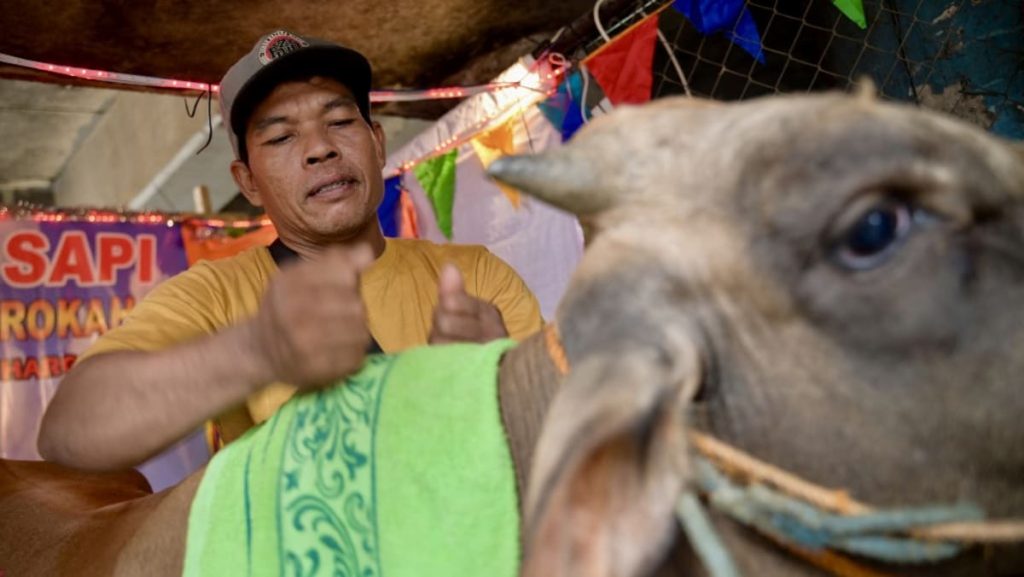Sumarwan is one of just two individuals in North Jakarta who specializes in providing massages for cattle, particularly for the major Islamic holiday of Eid al-Adha. His cow salon is located within an underpass that serves as a temporary market for livestock trading, with hundreds of cows and goats being bought and sold. Despite the noisy traffic on the motorway above, the animals remain calm and undisturbed. Sumarwan believes the location of the market is advantageous, providing shelter from the intense tropical heat and sudden heavy rainfall. Ensuring the health of the animals is crucial for the sacrifice ritual, and Sumarwan even uses a balm usually meant for humans on unhealthy cows.
The temporary livestock market in Jakarta is one of many across the city that sell animals for Eid al-Adha, a Muslim tradition where livestock are sacrificed and the meat is distributed to the less fortunate. Sumarwan’s employer, Kastono, has been in the animal sacrifice business for 15 years, bringing livestock from Central Java to Jakarta for sale. This year, they have brought 50 cows and 120 goats to sell, beginning the process 25 days before Eid al-Adha. Kastono employs 10 workers to help manage the business, which can be profitable with a healthy cow weighing 250kg fetching between 20 million rupiah and 27.5 million rupiah.
The well-being of the animals is a top priority for Kastono and Sumarwan’s business, as healthy livestock are crucial to successful sales and customer satisfaction. The massages provided by Sumarwan are believed to help relax the cows and improve their overall health, making them suitable for sacrifice. In some cases, Sumarwan uses a human balm to treat any visible signs of illness in the cows. The market provides a unique setting for these transactions, with the noise and chaos of the surrounding traffic contrasting with the peaceful and often beautifully adorned livestock.
Despite the challenges of operating a livestock market in an urban setting, Kastono and Sumarwan are dedicated to their business, ensuring that their animals are well-cared for and in good condition for the sacrifices. The rituals of Eid al-Adha hold deep religious and cultural significance for the Muslim community, and providing healthy animals for sacrifice is essential to honoring these traditions. The demand for livestock during this time is high, and Kastono’s business plays an important role in meeting that demand while also ensuring the welfare of the animals being sold. The cow salon within the underpass serves as a unique and essential part of the Eid al-Adha market in North Jakarta.
The relationship between Sumarwan, Kastono, and their livestock reflects the intersection of urban life and traditional agricultural practices during the festive period of Eid al-Adha. The makeshift market within the underpass is a vibrant and bustling hub of activity, where animals are traded, bought, and prepared for the upcoming holiday. The importance of maintaining the health and well-being of the animals, as demonstrated by Sumarwan’s massages and treatments, highlights the care and dedication that goes into preparing for the sacrifice ritual. This blending of modern urban infrastructure with age-old agricultural traditions showcases the unique and diverse cultural landscape of Jakarta during Eid al-Adha.















